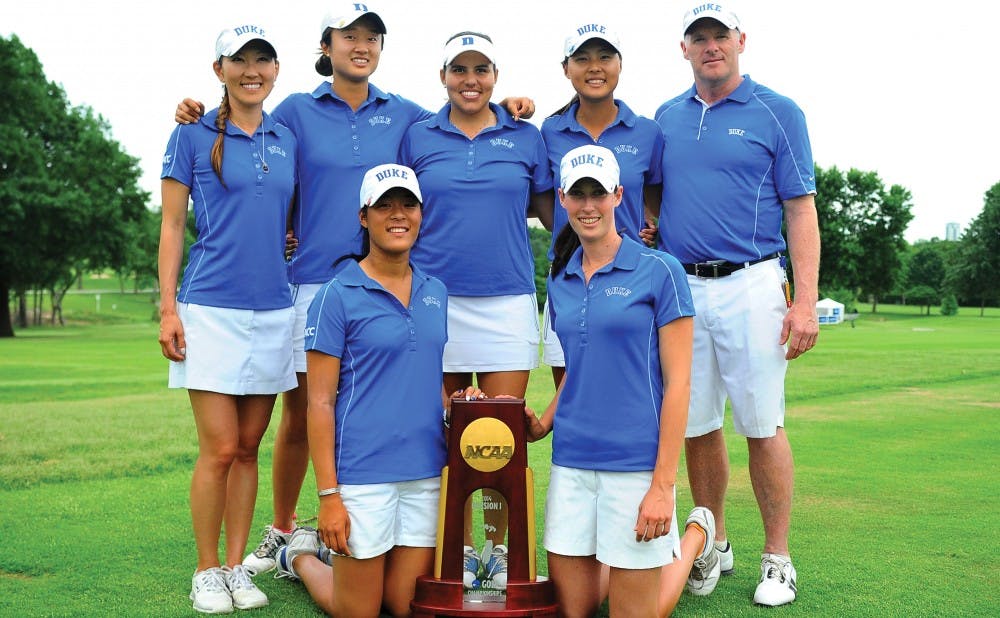Last year, Duke finished second at the NCAA Championship, losing to Southern California by a whopping 21 strokes.
This year, after taking a six-stroke lead into the final round, the Blue Devils found themselves trailing an almost-identical Trojan squad with just nine holes left in the tournament.
That’s when head coach Dan Brooks stepped in.
“The fact that [Southern California] had come back and had us by three or four shots at the turn, had the momentum and had played the difficult holes—that didn’t look very good for Duke,” Brooks said. “We needed to counter [Southern California’s momentum] and get some sort of rally going. [Assistant coach Jeanne Cho] and I just went to each player and tried to get [more] energy going, and even talked to the Duke fans to get them to make a little noise.”
The small move Brooks made was just one of the many that have defined his historic career, as Duke went on to make 13 birdies on the back nine as a team and win by two strokes, giving the Oregon native his sixth national title in the last 15 years.
The six championships Brooks has earned for the Blue Devil women’s golf program are the most of any Duke athletic program, and his 18 ACC Championships and 119 tournament victories make him the winningest coach in the sport.
The 30-year veteran uses a very basic characteristic to evaluate each of his squads.
“I’m [always] looking for heart,” Brooks said. “If you’ve got the passion, you’ll find out if your talent is as good as other people’s talent. Southern California was so good this year, and for us to have a chance to beat them, we needed to be a team. We needed to have a lot coming from the belly, and a lot came from the belly with this team. That’s how we were able to [win].”
A defining aspect of Brooks’ coaching style is the independence and freedom he gives his players, regardless of their prowess.
Based on the respect his current players say the six-time National Coach of the Year treats them with, it seems that sustained excellence—including three consecutive national titles from 2005-2007—has not changed how Brooks develops talent.
He continues to work collaboratively with his players, frequently letting them determine which aspect of their game needs work on any given day.
“One of the best things is that [he gives] you a lot of freedom, so he’s not going to impose anything on you,” rising junior Celine Boutier—the WGCA Player of the Year—said. “That’s really important for us because we don’t have much time to practice, so we have to use our time very efficiently. The fact that he’s letting us do whatever we feel like doing is more efficient and respectful [because] we all might not need to work on the same thing.”
Although it took Brooks 15 years to win his first national title, in that time he developed a sustainable model of success based on recruiting and developing hungry individuals that care about more than just golf.
Having gone through the ups and downs that come with building a championship-caliber program, Brooks’ experience and commitment to focusing on more than just pure talent make him stand out to those that spend the most time with him.
“He’s very good at recruiting good character, not just the best player,” Cho said. “When you recruit not just the best players, when you go for more than that, you can actually build on that once they get here. He’s [also] very experienced, having won so many times. He can use that experience and knows how to handle everything. He knows [women’s golf] front and back.”
In addition to crediting Cho—Brooks’ assistant since 2010 who speaks French, English, Spanish and Korean and uses her linguistic versatility often with Duke’s international players—Brooks also credits Alex Merrill, Jacki Silar, Kenny King, Darin Garrett and the countless other professionals surrounding him for the program’s success.
Merrill works with the team’s strength and conditioning, Silar is the administrator that works closest with Brooks, King is the team’s academic advisor and Garrett is the superintendent of the varsity golf practice area at the Duke University Golf Club where the team practices.
According to Brooks, the entire staff associated with the program “is so positive and so good at what they do….That kind of a staff can make the two-shot difference that won the national championship.”
Despite losing three of the five players from last year’s lineup, Brooks has full confidence in the remaining players and the recruits coming in because of his proven methods.
He has shown he can win with different types of players and personalities.
Get The Chronicle straight to your inbox
Sign up for our weekly newsletter. Cancel at any time.
“It may involve leaving somebody alone, or it may involve spending hours with that kid,” Brooks said of his coaching style. “It just all depends on the player’s needs [because] this is an individual game. You don’t pass a ball. It’s my job to connect with you and figure out what you need and make sure it happens.”

